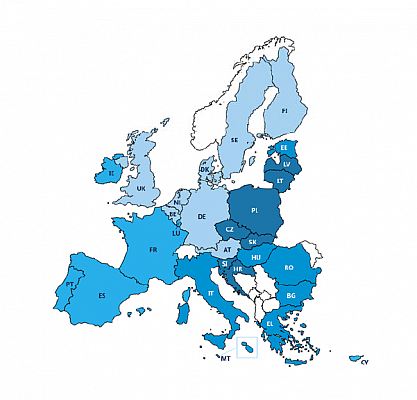AWARENESS OF BENEFITS FROM EU REGIONAL POLICY IS ON THE RISE
With around 352 billion Euro, the funding instruments of EU Regional Policy account for approximately one third of the EU budget for the period 2012-2020. The European Regional Development Fund (ERDF), European Social Fund (ESF) and the Cohesion Fund are the funding sources to support less developed regions and to strengthen economic, social and territorial cohesion.
The recently published Eurobarometer publication on “Citizens’ awareness and perceptions of EU regional policy” now revealed that over two thirds of citizens in the European Union think that EU Regional Policy has a positive impact in their city and region. In Central and South East Europe, citizens perceive a particular added-value of Regional Policy.
While the impact of Regional Policy seems to be well perceived, respondents seemed to be less aware of the respective funding instruments. About 50% of respondents have heard about at least one of the two development funds – European Regional Development Fund (ERDF) and Cohesion Fund. Citizens in Croatia, in the Czech Republic and Bulgaria are the most likely to be aware of the European Regional Development Fund (ERDF).
At the same time, EU regional funding for cross-border cooperation is far less known among EU citizens. Only a fifth of respondents were aware of cross border cooperation due to EU Regional Policy.
HOW DO PEOPLE KNOW ABOUT EU REGIONAL POLICY?
The Eurobarometer publication shows that national TV is the main source of information about EU Regional Policy, followed by local and regional newspapers and the internet. Compared to the results of the survey from 2015, the Internet is slightly rising as source of information.
WHERE SHOULD THE EU INVEST?
In regard to geographical allocation of funding, the respondents’ opinion was devided. However, the majority (53%) of respondents tended to opt for investment in all regions. 40% of respondents prefered to focus investment only in poorer regions. Comparing the results to earlier surveys, the current survey confirms the trend towards investment in all EU regions.
Education, health and social infrastructure are considered to be the most important areas for investment. This was especially highly valued in Hungary, Croatia and Latvia.
LOW AWARENESS OF MACRO-REGIONAL STRATEGIES
In general, public knowledge about EU strategies to promote cooperation is rather low. Asked about the macro-regional strategies in particular, only very few respondents were aware of the them. The EU Strategy for the Baltic Sea Region (EUSBSR) turns out to be not only the oldest but also the best-known macro-regional strategy (14%). The EU Strategy for the Danube Region (EUSDR) and the EU Strategy for the Alpine Region (EUSALP) are both known by 8% of respondents, while 7% of respondents stated to have heard about the EU Strategy for the Adriatic Ionian Region (EUSAIR).




